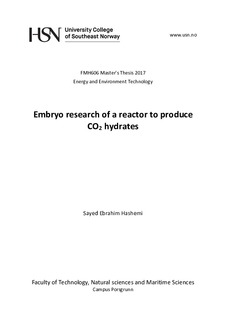Embryo research of a reactor to produce CO2 hydrates
Master thesis
Permanent lenke
http://hdl.handle.net/11250/2484584Utgivelsesdato
2017Metadata
Vis full innførselSamlinger
Sammendrag
The potential applications of carbon dioxide hydrate have attracted many interests over the past decade. CO2 transmission in the form of hydrate is an alternative way of transportation in CCS chain, however, the CO2 hydrate transportation might be challenging. Evolution of this concept is considered in the present work through developing hydrate formation reactor. The induction time and the initial hydrate formation temperature of CO2 hydrate are measured within batch and semi-batch reactors. Moreover, the effect of adding various thermodynamic promoters on induction time is investigated at an isobaric procedure.
The results show that semi-batch reactor initiates to form CO2 hydrate faster than batch reactor. Also, increasing the pressure inside the reactor reduces the induction time. The experiments illustrated that THF and TBAF had a better effect on reduction of induction time compared with other studied promoters. In addition, a higher concentration of promoter facilitated the hydrate formation. Thus, an increase in promoter concentration decreased the induction time and also increased the initial hydrate formation temperature. Also, repetition of the CO2 hydrate formation and dissociation cycle led to a reduction in induction time and an increase in the initial hydrate formation temperature. Observations from experiments approved the possibility of CO2 hydrate transmission at the metastable condition.
